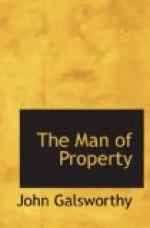They looked at each other.—And, as though he had done that which no Forsyte did—given himself away, young Jolyon drew into his shell. Bosinney broke the silence.
“Why do you take your own people as the type?” said he.
“My people,” replied young Jolyon, “are not very extreme, and they have their own private peculiarities, like every other family, but they possess in a remarkable degree those two qualities which are the real tests of a Forsyte—the power of never being able to give yourself up to anything soul and body, and the ’sense of property’.”
Bosinney smiled: “How about the big one, for instance?”
“Do you mean Swithin?” asked young Jolyon. “Ah! in Swithin there’s something primeval still. The town and middle-class life haven’t digested him yet. All the old centuries of farm work and brute force have settled in him, and there they’ve stuck, for all he’s so distinguished.”
Bosinney seemed to ponder. “Well, you’ve hit your cousin Soames off to the life,” he said suddenly. “He’ll never blow his brains out.”
Young Jolyon shot at him a penetrating glance.
“No,” he said; “he won’t. That’s why he’s to be reckoned with. Look out for their grip! It’s easy to laugh, but don’t mistake me. It doesn’t do to despise a Forsyte; it doesn’t do to disregard them!”
“Yet you’ve done it yourself!”
Young Jolyon acknowledged the hit by losing his smile.
“You forget,” he said with a queer pride, “I can hold on, too—I’m a Forsyte myself. We’re all in the path of great forces. The man who leaves the shelter of the wall—well—you know what I mean. I don’t,” he ended very low, as though uttering a threat, “recommend every man to-go-my-way. It depends.”
The colour rushed into Bosinney’s face, but soon receded, leaving it sallow-brown as before. He gave a short laugh, that left his lips fixed in a queer, fierce smile; his eyes mocked young Jolyon.
“Thanks,” he said. “It’s deuced kind of you. But you’re not the only chaps that can hold on.” He rose.
Young Jolyon looked after him as he walked away, and, resting his head on his hand, sighed.
In the drowsy, almost empty room the only sounds were the rustle of newspapers, the scraping of matches being struck. He stayed a long time without moving, living over again those days when he, too, had sat long hours watching the clock, waiting for the minutes to pass—long hours full of the torments of uncertainty, and of a fierce, sweet aching; and the slow, delicious agony of that season came back to him with its old poignancy. The sight of Bosinney, with his haggard face, and his restless eyes always wandering to the clock, had roused in him a pity, with which was mingled strange, irresistible envy.
He knew the signs so well. Whither was he going—to what sort of fate? What kind of woman was it who was drawing him to her by that magnetic force which no consideration of honour, no principle, no interest could withstand; from which the only escape was flight.




